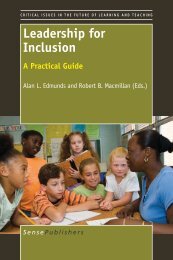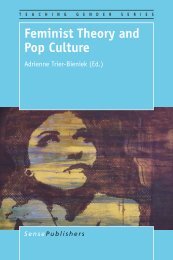1177-threshold-concepts-and-transformational-learning
1177-threshold-concepts-and-transformational-learning
1177-threshold-concepts-and-transformational-learning
- No tags were found...
Create successful ePaper yourself
Turn your PDF publications into a flip-book with our unique Google optimized e-Paper software.
SCHWARTZMANA resource for teaching faculty. Many presenters at the 2008 TC conferencespoke about their attempts to reach disengaged, even disaffected, students, <strong>and</strong>their various successes or difficulties in doing so. A theoretical foundation for TC(<strong>and</strong> its defined explanatory theory) should serve as a resource for such faculty;suggesting meaningful interpretation(s) of student behaviors <strong>and</strong> exp<strong>and</strong>ing thediscourse to explore their causes <strong>and</strong> origins (Gurwitsch 1974).Resolving Lacunae: representations of student experience. Lacunae remain in thedefinitions stated above for <strong>threshold</strong> <strong>concepts</strong>. All defining characteristics, exceptfor troublesome, describe the aftermath – not the experience – of students’successful acquisition of challenging material. In themselves, these characteristicsinclude no reference to what would facilitate teaching tc content. Like tc’s,liminality has been defined by its consequences: anxiety; <strong>and</strong> by its hoped-forconsequences: transformation <strong>and</strong> ontological shift. To date, TC scholarship regardingliminal space employs a metaphor from anthropology concerning states of beingdefined by social structure, <strong>and</strong> transitions among them (Turner 1969, Meyer &L<strong>and</strong> 2005 p. 375). It depicts implications of journey through that space astransformations or ontological shifts, but does not address the nature of either thespace or the journey. In itself, the definition includes no information that facilitatessupporting a student on the journey. A theoretical foundation for TC (<strong>and</strong> itsdefined explanatory theory) should serve as resources for resolving such lacunae,suggesting useful possibilities to facilitate teaching tc content <strong>and</strong> support studentsexperiencing difficulty in the face of that content.Rigorously defined terminology. Existing TC terminology conflates elementswith distinct, even divergent meanings, <strong>and</strong> implicitly expresses assumptions thatmay not hold; making careful analysis more difficult. For example, “<strong>threshold</strong>” canbe understood to refer to both the experience <strong>and</strong> the content of an encounter withdeeply challenging material. It can also imply that to learn means to be hoistedover an existing (provisionally) stable <strong>threshold</strong> in a fixed world, so that theindividual acquires ... a new status <strong>and</strong> identity (Meyer & L<strong>and</strong> 2005 p. 376).A theoretical foundation for TC (<strong>and</strong> its defined explanatory theory) should serveas clarifying resources, enabling greater precision in terminology – <strong>and</strong> thereby inscholarship.Questions to be AddressedA traditional scientific community participates in a coherent research tradition(Kuhn 1996 p. 46) delineated by – <strong>and</strong> communicated through – its extant paradigm.In a traditional scientific field, the paradigm grows out of the central motivatingquestion for the discipline. No such question has yet been defined – or evenexplicitly sought – in TC scholarship. I propose a central question for TC, <strong>and</strong> poseit from three perspectives, those of:1) the practitioner teacher: How to ensure students’ <strong>learning</strong> of deeply challengingmaterial?26




